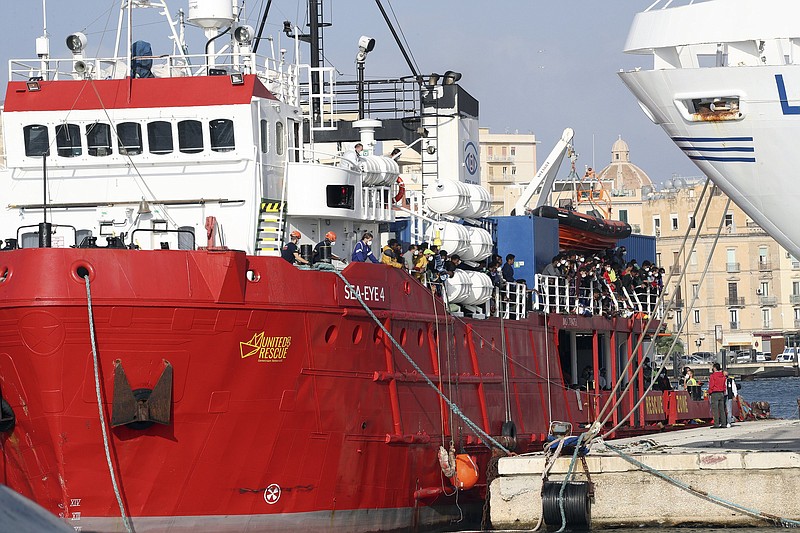Migrant-rescue ship reaches Italian port
ROME -- A German humanitarian ship with more than 800 rescued migrants, including 15 young children, steamed into a Sicilian port on Sunday after being granted permission by Italian authorities following days of waiting in the Mediterranean Sea.
The charity group Sea-Eye said the vessel Sea-Eye 4 was assigned to the Italian port of Trapani, in western Sicily, on Saturday evening. Most of the adults were to be transferred to other ships for quarantine against covid-19, while some 160 minors, including babies and other children younger than 4, were to be taken to shelters on land.
Many of the passengers arrived from countries in West Africa, Egypt or Morocco, said Giovanna di Benedetto, an official from Save the Children in Italy.
About half of the migrants were rescued Thursday from a sinking wooden boat, while the other passengers had been plucked to safety from the sea in separate operations.
Sea-Eye officials lamented that Malta, a European Union island nation in the central Mediterranean, hadn't responded to the wooden boat's distress signal in its own search area.
Pope raises concerns on Ethiopia crisis
VATICAN CITY -- Pope Francis on Sunday decried the deteriorating humanitarian crisis in Ethiopia and pressed for dialogue to prevail instead of a protracted war.
The pontiff in his traditional appearance to the public in St. Peter's Square said he was following with "worry" the news from the Horn of Africa, particularly from Ethiopia, "shaken by a conflict that has dragged on for more than a year and has caused numerous victims and a grave humanitarian crisis."
The war in Ethiopia's northern Tigray region has killed thousands of people, displaced millions and left many struggling with severe hunger.
"I invite everyone to pray for those populations so harshly tried, and I renew my appeal so that fraternal harmony and the peaceful path of dialogue may prevail," Francis said.
On Friday, the U.N. Security Council called for an end to the intensifying and expanding conflict and for unhindered access for humanitarian aid to tackle the hunger crisis.
The Rome-based U.N. World Food Program reported last week that its urgent requests to allow trucks carrying food, medicine and other humanitarian assistance have gone unheeded.
Poland permits abortion if woman at risk
WARSAW, Poland -- Poland's Health Ministry on Sunday issued instructions to doctors confirming that it is legal to terminate a pregnancy when the woman's health or life is in danger, a directive that comes amid apparent confusion over a new restriction in the country's abortion law.
The document addressed to obstetricians came in reaction to the hospital death of a 30-year-old woman whose 22-week pregnancy encountered medical problems.
The woman died in September, but her death became widely known this month. Doctors at the hospital in Pszczyna, in southern Poland, held off on terminating her pregnancy despite the fact that her fetus lacked enough amniotic fluid to survive, her family and a lawyer say.
The doctors have been suspended, and prosecutors are investigating.
Angered Poles held nationwide protests over the weekend, blaming the woman's death on Poland's restrictive abortion law.
The ministry stressed that it is in line with the law to terminate a pregnancy when the woman's health is in danger, even more so in a case that threatens her life. It included guidance in case of premature loss of the amniotic fluid.
Until a year ago, women in Poland could have abortions in three cases: if the pregnancy resulted from a crime like rape, if the woman's health or life was at risk, or in the case of irreparable defects of the fetus. That last possibility was eliminated a year ago, when the Constitutional Tribunal ruled that it went against Poland's law.
Police: Train riders stabbed 'at random'
VIENNA -- A 27-year-old man accused of stabbing four people on a German high-speed train apparently attacked his victims "at random" and showed signs of mental illness, authorities said Sunday.
Police and investigators told reporters in Neumarkt in der Oberpfalz that the attacker's intentions were still unclear, but there is no current indication of a terror motive. The suspect was arrested on the train after Saturday's attack, offering no resistance to police, and has since been taken to a psychiatric clinic.
Shortly before 9 a.m. Saturday, police received a call that a man with a knife was attacking passengers on Intercity Express train 928, which was traveling from Regensburg to Nuremberg in southeastern Germany.
All four victims were men. Two of the four remained in the hospital Sunday.
Investigators said an initial evaluation suggested the suspect suffered from mental illness, including potential "paranoid schizophrenia," said chief prosecutor Gerhard Neuhof.
The suspect reportedly believed that he had been followed by the police "for some time" and attacked his first victim because he thought the man was threatening him and "wanted to kill him," Neuhof said.


